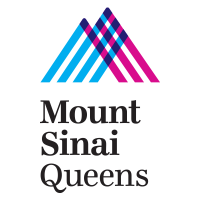Mount Sinai Health System
Mount Sinai Health System is a comprehensive health care system based in New York City, United States. It was formed in September 2013 by the merger of Continuum Health Partners and the Mount Sinai Medical Center. The health system provides a wide range of medical services from primary care to advanced specialty care and has a significant focus on research and education.
History[edit | edit source]
The origins of the Mount Sinai Health System can be traced back to the founding of the Mount Sinai Hospital in 1852. The hospital was established to provide care to the poor and underserved populations of New York City. Over the years, it evolved into a leading medical institution, known for its commitment to patient care, research, and education.
In 2013, Mount Sinai Medical Center merged with Continuum Health Partners, a network of hospitals including Beth Israel Medical Center, St. Luke’s Hospital, and Roosevelt Hospital, to form the Mount Sinai Health System. This merger expanded the system's reach and capabilities, making it one of the largest health care systems in New York City.
Components[edit | edit source]
The Mount Sinai Health System comprises eight hospital campuses, including the flagship Mount Sinai Hospital, Mount Sinai Beth Israel, Mount Sinai Morningside, and Mount Sinai West. It also includes the Icahn School of Medicine at Mount Sinai, one of the leading medical schools in the United States, which is integral to the system's research and educational missions.
Hospitals[edit | edit source]
- Mount Sinai Hospital – The flagship hospital, known for its advanced care in a wide range of specialties.
- Mount Sinai Beth Israel – A hospital with a strong focus on behavioral health and outpatient services.
- Mount Sinai Morningside – Offers comprehensive care, including emergency services and a wide range of specialty services.
- Mount Sinai West – Provides a broad array of medical and surgical services.
Icahn School of Medicine at Mount Sinai[edit | edit source]
The Icahn School of Medicine at Mount Sinai is renowned for its innovative research programs, educational excellence, and commitment to translating scientific discoveries into clinical therapies. It offers a range of degree programs, including MD, PhD, and dual degrees, and is a leader in biomedical research and medical education.
Research and Innovation[edit | edit source]
Mount Sinai Health System is at the forefront of medical research and innovation. Its researchers are involved in groundbreaking studies across various disciplines, including genetics, oncology, and neuroscience. The health system is also known for its use of advanced technology and data analytics to improve patient care and outcomes.
Community Outreach[edit | edit source]
Mount Sinai is committed to serving the diverse communities of New York City. It offers numerous community programs and services aimed at promoting health and wellness, providing education, and ensuring access to quality medical care for underserved populations.
Challenges and Future Directions[edit | edit source]
Like many health care systems, Mount Sinai faces challenges such as managing the costs of care, adapting to changes in health care policy, and meeting the needs of a diverse and growing patient population. The system continues to focus on innovation, research, and community engagement as key strategies for addressing these challenges and improving health care delivery.
Search WikiMD
Ad.Tired of being Overweight? Try W8MD's physician weight loss program.
Semaglutide (Ozempic / Wegovy and Tirzepatide (Mounjaro / Zepbound) available.
Advertise on WikiMD
|
WikiMD's Wellness Encyclopedia |
| Let Food Be Thy Medicine Medicine Thy Food - Hippocrates |
Translate this page: - East Asian
中文,
日本,
한국어,
South Asian
हिन्दी,
தமிழ்,
తెలుగు,
Urdu,
ಕನ್ನಡ,
Southeast Asian
Indonesian,
Vietnamese,
Thai,
မြန်မာဘာသာ,
বাংলা
European
español,
Deutsch,
français,
Greek,
português do Brasil,
polski,
română,
русский,
Nederlands,
norsk,
svenska,
suomi,
Italian
Middle Eastern & African
عربى,
Turkish,
Persian,
Hebrew,
Afrikaans,
isiZulu,
Kiswahili,
Other
Bulgarian,
Hungarian,
Czech,
Swedish,
മലയാളം,
मराठी,
ਪੰਜਾਬੀ,
ગુજરાતી,
Portuguese,
Ukrainian
Medical Disclaimer: WikiMD is not a substitute for professional medical advice. The information on WikiMD is provided as an information resource only, may be incorrect, outdated or misleading, and is not to be used or relied on for any diagnostic or treatment purposes. Please consult your health care provider before making any healthcare decisions or for guidance about a specific medical condition. WikiMD expressly disclaims responsibility, and shall have no liability, for any damages, loss, injury, or liability whatsoever suffered as a result of your reliance on the information contained in this site. By visiting this site you agree to the foregoing terms and conditions, which may from time to time be changed or supplemented by WikiMD. If you do not agree to the foregoing terms and conditions, you should not enter or use this site. See full disclaimer.
Credits:Most images are courtesy of Wikimedia commons, and templates, categories Wikipedia, licensed under CC BY SA or similar.
Contributors: Prab R. Tumpati, MD


